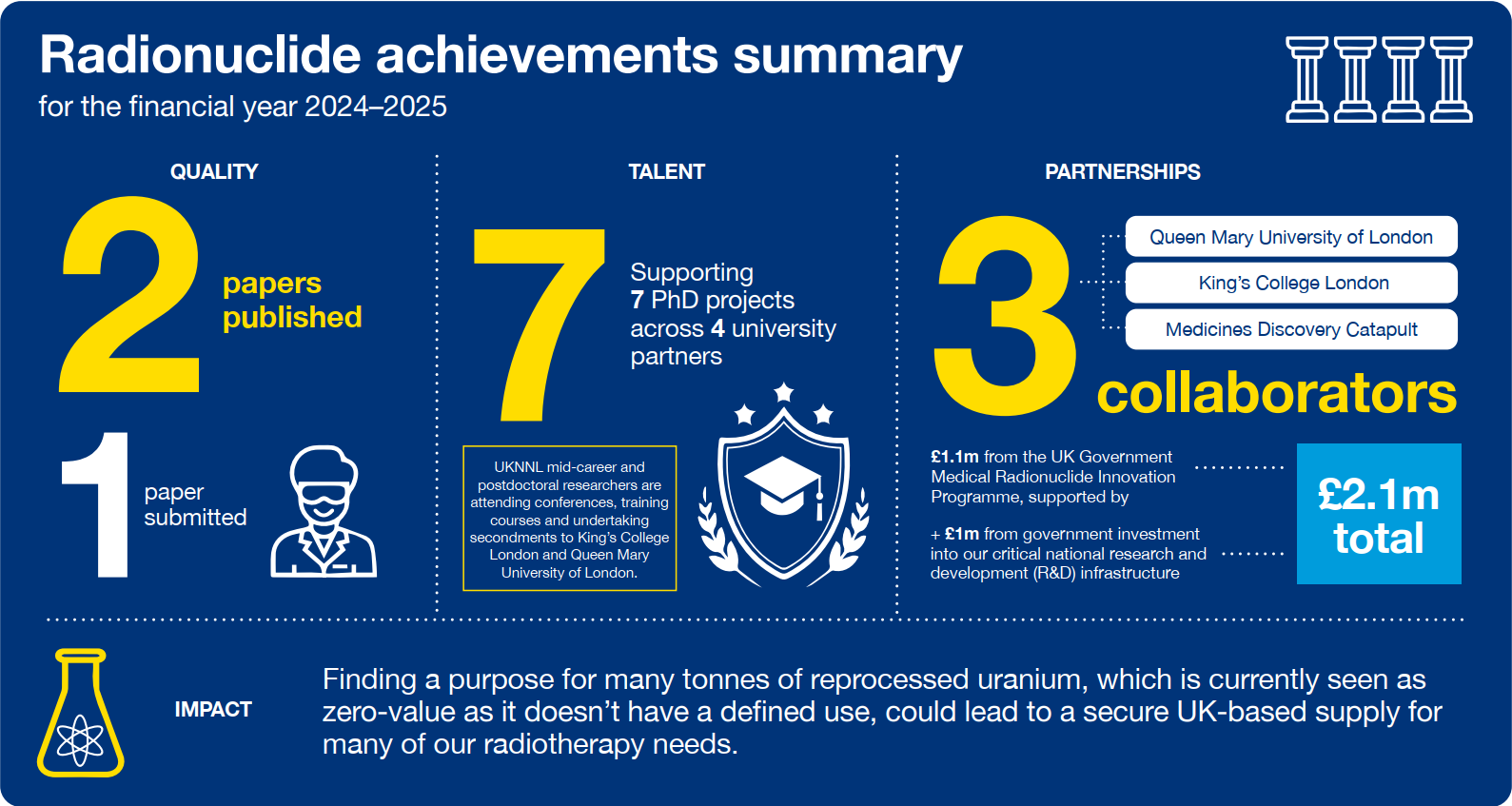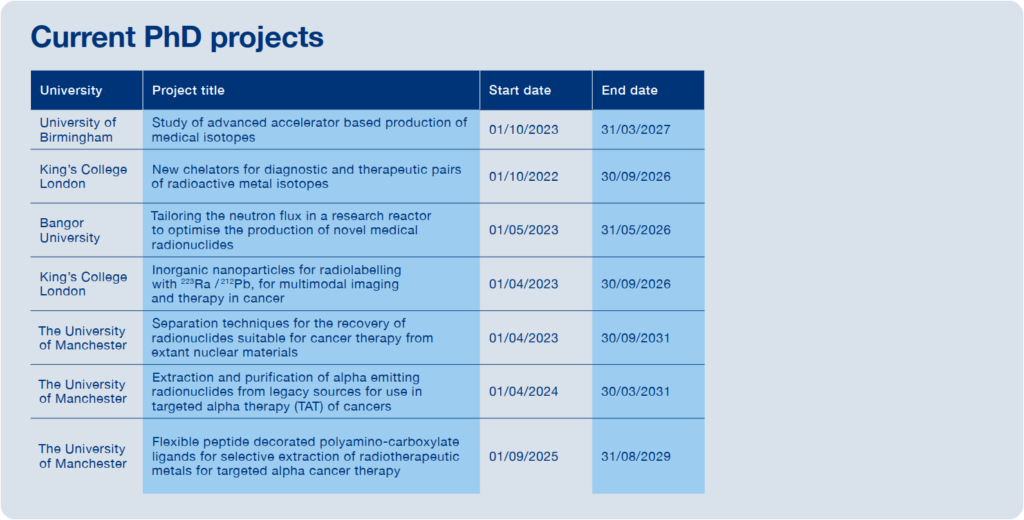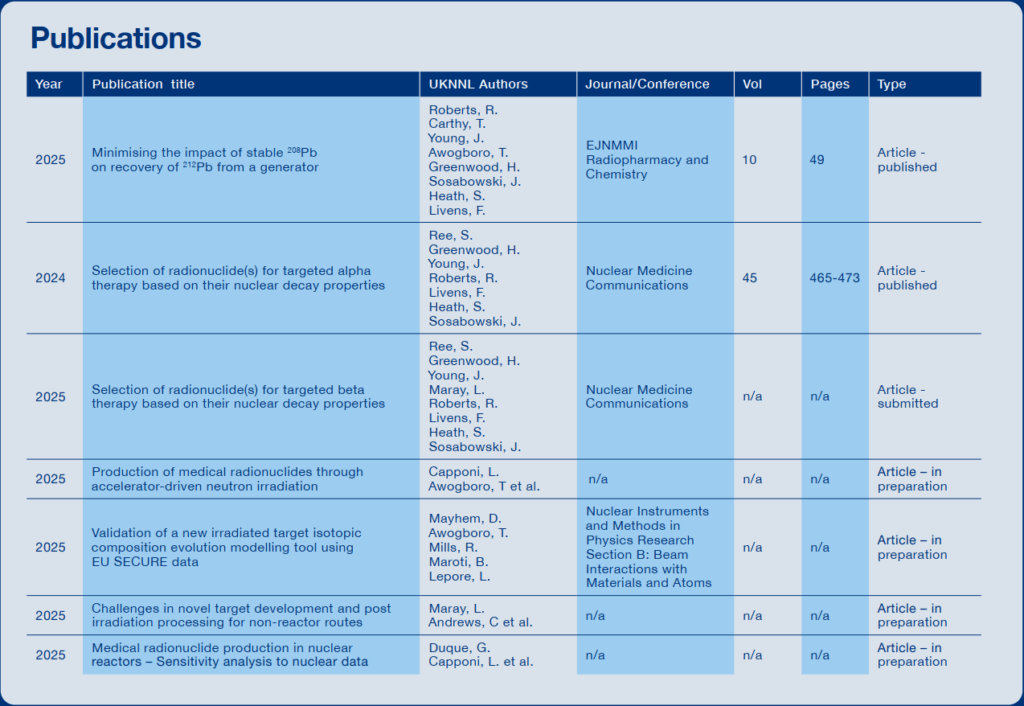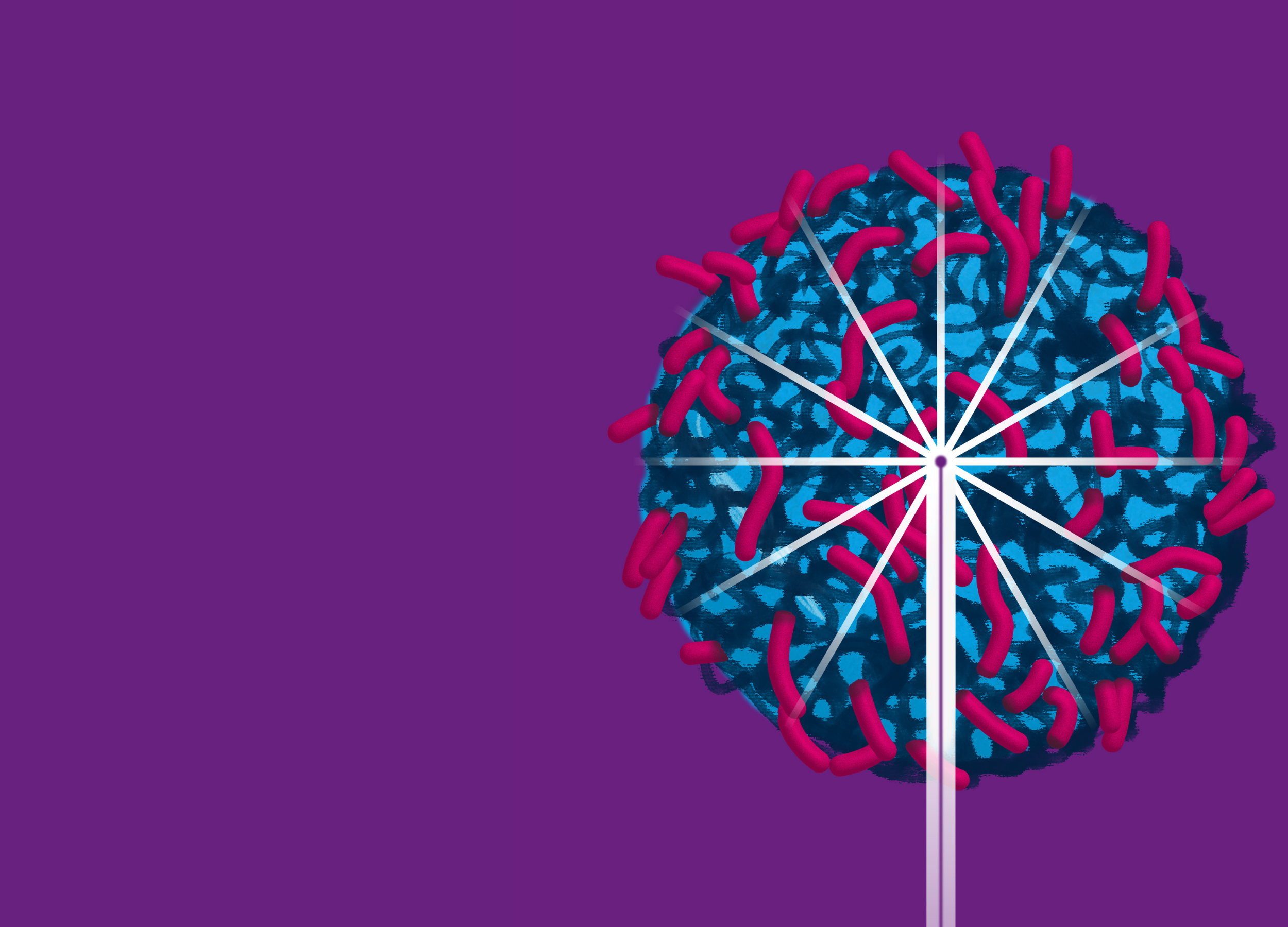UKNNL chemists’ research could secure sustainable supplies of medical radionuclides for serious disease diagnosis and treatment. These innovative techniques, which extract medical radionuclides from stored nuclear material, could lead to a UK-based supply chain that could meet demand for several hundred years.
The nuclear industry currently stores material containing a wealth of radioactive isotopes that can be extracted for various purposes.
UKNNL is leveraging its skills and expertise in chemical separations, by pairing it with medical expertise at other research institutions to develop a new, secure supply of these valuable assets.
The UK needs a secure supply of radionuclides and UKNNL’s research is supporting its development using byproducts from the production of nuclear power. Read more about why the UK needs a secure supply of radionuclides and how UKNNL’s research is supporting its development using by products from the production of nuclear power.
The need for a home-grown supply of medical radionuclides
The current supply of medical isotopes to the NHS has limited capacity and predominantly relies on importing the radionuclides from abroad. A reliable supply of these isotopes is essential to ensuring medical treatments can be administered rapidly, but building an irradiation facility to create them would take until the 2030s. UKNNL is developing the capability to supply a range of isotopes from existing materials created as by-products from the nuclear fuel cycle. This is a promising production route and supports sustainability through reusing materials.
Radioactive isotopes (radionuclides) are required for a variety of vital medical procedures. One of the most common uses of medical isotopes in the UK is for diagnosing disease by positron emission tomography (PET) scans that provide a detailed 3D image inside the body. PET scans are used for diseases impacting the brain and heart, and to understand the spread of confirmed cases of cancer. Advances in radiopharmaceutical science have identified specific radionuclides that are currently being used in clinical trials around the world to treat cancer, using targeted beta or alpha therapy.
“ Precision radiopharmaceuticals present a huge opportunity for the UK to lead the world again in medicinal radiochemistry. Creating these new targeted treatments from stored nuclear waste could transform patient outcomes and give the UK back its domestic radiochemical capacity to serve its patients. To do this, we must invest in the infrastructure necessary to produce the materials and run patient trials.
“ Combining MDC’s specialised radiochemistry and drug discovery expertise with UKNNL’s nuclear prowess, this project will accelerate important research to secure a sustainable supply of radionuclides for medicines. Doing so will unlock the development of game-changing treatments for cancer and improve patient lives.”

Professor Chris Molloy
CEO of Medicines Discovery Catapult
UKNNL’s work can develop a secure supply of medical isotopes suitable for a variety of cancer treatments that are being developed by medical research organisations. Not only is the laboratory investing in a route to extract medical isotopes, but it’s also installing a new laboratory which will be used by visiting researchers to develop the targeting molecules.
This will help accelerate research into targeted cancer therapy and provide an environment for researchers to hone their skills. UKNNL is working with Medicines Discovery Catapult (MDC) to develop a supply of a specific radionuclide, lead-212, which looks promising for targeted alpha therapy.
NuClear Science in depth: Innovation to create new sources of supply
A range of different by-products from nuclear operations could be used to create a secure supply of medical radionuclides.
One promising by-product is reprocessed uranium, which is a stored and monitored asset in the UK. As the uranium undergoes natural radioactive decay, many different chemical elements are produced which can be separated and utilised.
To extract the useful radionuclides, a multi-step process dissolves the uranium before extracting thorium-228 (Th) in a set-up known as a thorium cow. The thorium decays naturally over several years, allowing the useful radionuclides – radium-224 which decays to lead-212 – to be extracted periodically.
Having demonstrated the success of the thorium cow, UKNNL is now focusing on achieving the purity required for the next stage.
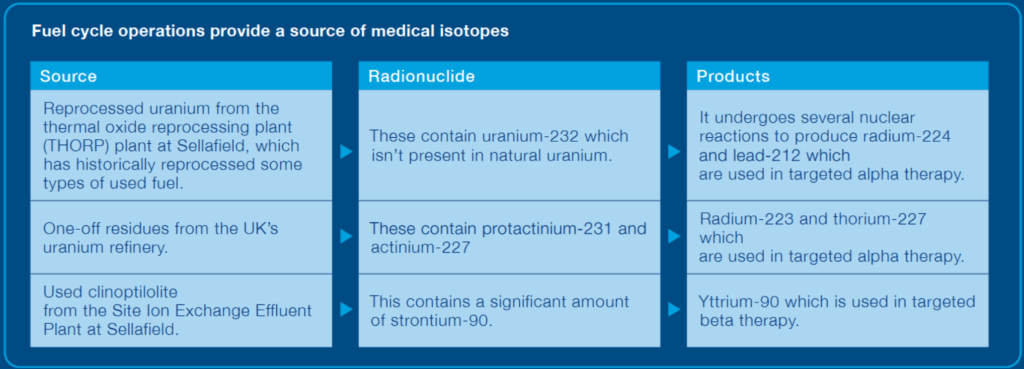
Targeted alpha therapy can directly treat cancer cells, minimising adverse effects of cancer treatments. This typically employs a ‘construct’: a molecule made up of four distinct parts. The radionuclide is held by a chemical known as a chelator. A chemical linker binds this to a biomolecule (the biological conjugate) which is designed to attach to specific receptors on the surface of the cancer cells. The alpha radiation given off by the radionuclides has a very short range so travels far enough to affect the nearby cancer cells while limiting the radiation dose to healthy cells. Alpha radiation is most likely to do a lot of damage to the DNA of the cancer cell, causing both strands of the double helix to break. Targeted beta therapy uses the same constructs and the beta radiation produced from the radionuclide is suitable for larger cancers that would not be completely penetrated by alpha radiation.
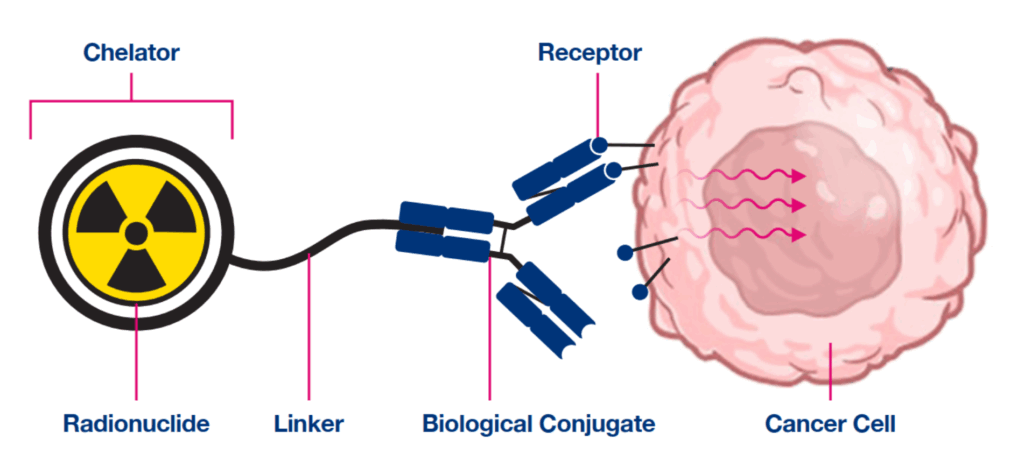
The steps involved in extracting useful medical isotopes from thorium-228
The uranium is dissolved in nitric acid then passed through a solid medium. Certain charged particles (ions) in the solid are exchanged for ions in the liquid. The chemistry is tuned so that only certain ions are exchanged, removing many of the radionuclides that aren’t useful. In our process, uranium isotopes are removed. The remaining liquid holds thorium-228, which also undergoes radioactive decay, leading to useful radionuclides being generated.
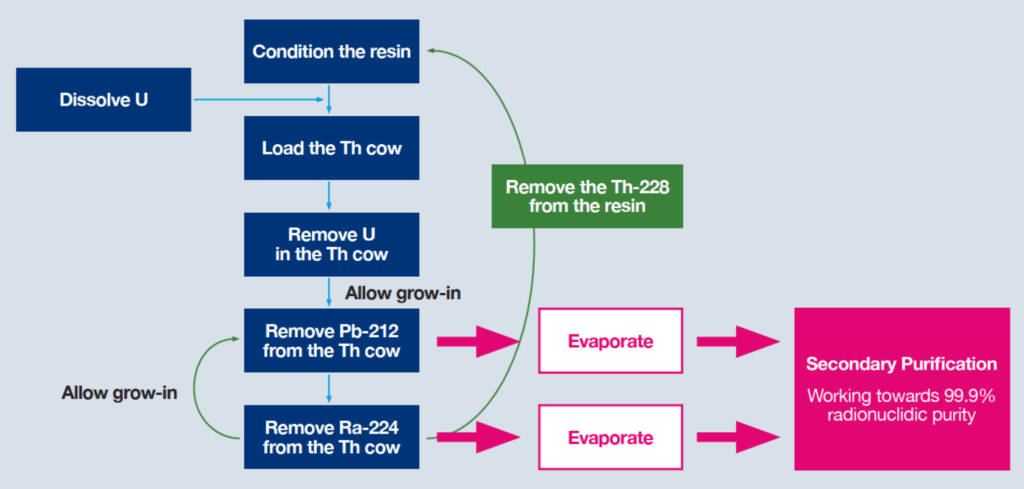
UKNNL has developed partnerships with Queen Mary University of London and King’s College London to progress the research to this point.
The project is supporting seven PhDs which are looking at more effective ways of identifying useful radionuclides produced from the multiple decay products of uranium, as well as how other by-products of nuclear power plants can be used.
By supporting these PhD researchers, the project is helping to develop the next generation of subject matter experts (SME) and equipping them with specific skills in data mining, chemical separations and more.
In addition, UKNNL is involved in the ‘Strengthening the European chain of supply for next generation medical radionuclides’ (SECURE) programme, alongside 17 universities and research institutions across Europe.
The focus of this programme is on promising developments in the design of irradiation targets, and production routes for existing and new isotopes in nuclear therapy and diagnostics.
Industrial fellowship supports research to recover useful radionuclides
UKNNL’s Samantha Ree is working on techniques to separate the useful radionuclides and has been awarded an industrial fellowship from the Royal Commission for the Exhibition of 1851 to support her PhD research. Samantha’s research involves data mining several databases to shortlist potential medical isotopes and she is now assessing multiple industrial sources for their suitability to supply these isotopes.
In addition, UKNNL’s Rachel Roberts is undertaking a UKNNL-funded PhD with the University of Manchester on ‘Extraction and purification of alpha emitting radionuclides from legacy sources for use in targeted alpha therapy (TAT) of cancers’.
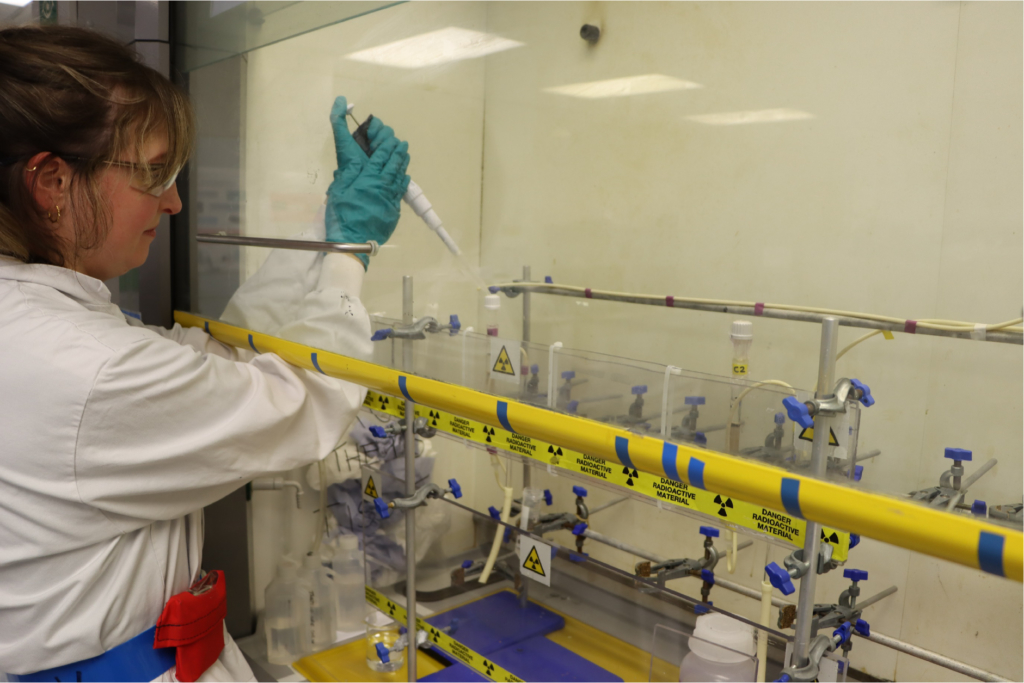
Production of medical radionuclides from nuclear material involves milking a thorium cow.
What the future holds
Research so far has worked with small amounts (around 2 MBq) of thorium-228 which has helped to establish the extraction techniques. The project will soon scale up to 10 MBq which will produce enough radium-224 and lead-212 to conduct in-depth development of the constructs. To support this, UKNNL is investing in a new laboratory where the constructs will be tested by visiting researchers.
Creating a construct requires in-depth knowledge of the chemistry. Optimising the chemical reaction involves considering many variables such as reaction time, temperature, and concentrations of the individual components.
Analysis helps with the optimisation which involves multiple iterations where each variable is thoroughly tested. The new laboratory at UKNNL’s Preston site will employ well-known analytical techniques to determine whether a construct is ready for the next stage of trials.
Researchers will be able to test their constructs in our laboratory to find the optimal production regime. In the long term, the knowledge and techniques developed by UKNNL will lead to development of a central production hub to supply the NHS with medical radionuclides from a UK supply chain that could last for centuries.
“This new initiative is immensely exciting, offering a huge boost to the future of molecular radiotherapy treatment and personalised medicine in the UK. Barts Cancer Institute and Radionuclides for Health UK welcome the leadership that UKNNL is showing on this issue. It is an important step in re-establishing a UK supply of medical radionuclides, securing the future of urgently needed research into new and more effective cancer treatments and making them available to UK patients.”
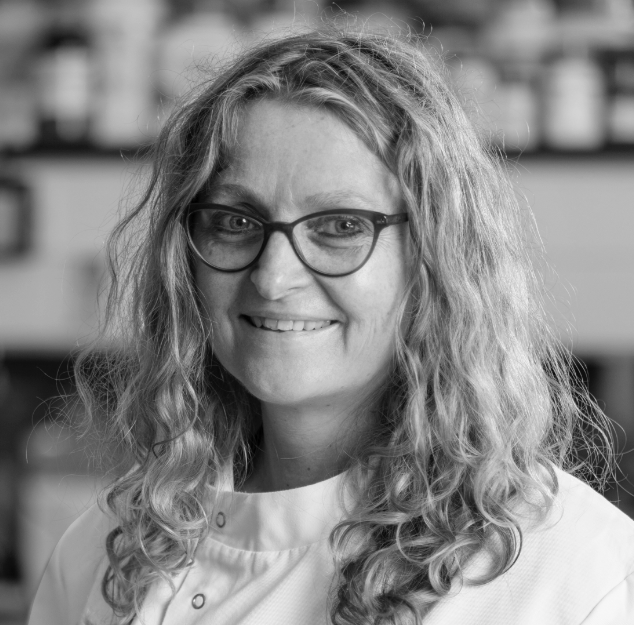
Professor Jane Sosabowski
Barts Cancer Institute Queen Mary University of London
